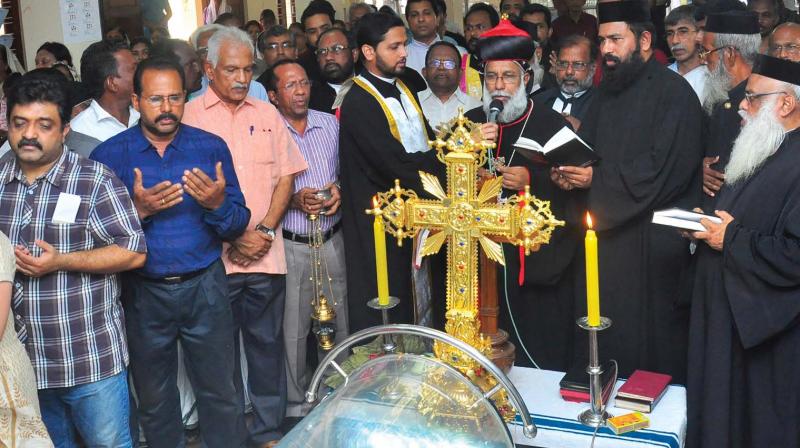Babu Paul: The encyclopedic mind
A rare soul about whom we cannot say ‘he is no more’ even though his earthly sojourn is over.

Babu Paul is one of the rare souls in our times about whom we cannot say ‘he is no more’ even though his earthly sojourn is over. As John Milton, the English epic poet said, there are a few individuals whose memory humanity ‘shall not willingly let die’. Such, I believe, is the case with Babu.
It is not my intent here to overwhelm my readers with an inventory of the positions of responsibility that Babu Paul held with devotion and distinction. My limited purpose is to pay tribute to the man I have known and admired.
Each time I met Babu I was reminded of the words of Jesus, “Man does not live by bread alone, but also by every word that comes from the mouth of God.” Human beings are of two categories: those who live by bread alone, and those who are driven incessantly and insatiably by needs that are far beyond the scope of bread to assuage. Babu was of the latter category. Till I met him, I used to entertain the old cliché, “you are as great as the goals you live for”. His life made me realize that no one can live for great goals so long as he or she lives by pedestrian nourishments. One has to choose between intellectual banquets and living only by belly cheer. To live by bread alone is to grow only in one’s girth. To live also by something beyond bread is to grow in one’s stature and relevance.
There are three qualities I could not help admiring in Babu. First, he was encyclopedic in knowledge. This would be readily granted by anyone in Kerala and beyond, who has even once listened to him. He was not only widely read, but had a mind clear, creative and capacious enough to hold his scholarship relevant and radiant.
He did not carry his scholarship ponderously about him. Instead, he let its light shine through every sentence he uttered, every point of view he advocated and every cause he served. Especially in matters ecclesial, Babu Paul was the last word in Kerala.
I have often wondered, what is it that makes a man –especially a file-pushing bureaucrat- crave for knowledge of diverse kinds? I have known bureaucrats and bureaucrats. I haven’t seen one like Babu in Delhi, which is the citadel of bureaucracy. Yes, there is Pavan Kumar, currently the political adviser to Nitish Kumar. But Babu outstrips him in the range scholarship. Navin Chawla, the former CEC, wrote Mother Teresa’s biography: but his canvas is tiny in comparison. Babu Paul didn’t have to throw himself into the ocean of knowledge as widely and wildly as he did, out of any professional compulsion. If he did itnonetheless, this points his thirst to contribute his very best to humankind at his times.
He knew that going by mere ‘opinions’ had become the pernicious habit of a vast majority of his contemporaries. He also knew that this undermined the foundation of truth in the public sphere. Babu, therefore, took the long and demanding route: that of being adequately and precisely informed on the issues he spoke about. He did not go by the opinions that floated in the air. He had something definite and definitive to say on every issue. And he had an unmistakable style for saying it.
The second trait that I found commendable in Babu was the balance he maintained between high professional propriety and deep religious commitment.
He was as unapologetic about his Christian convictions as he was about his secular, democratic persuasions. Smaller minds perceive a tension between the two. Babu resolved this apparent tension through spirituality, not religion per se. Spirituality is light; and light is equally relevant to the religious and secular dimensions of life.
The secret of Babu’s unrivalled professional maturity and distinction lay in his spirituality. He was what Immanuel Kant would call an ‘enlightened’ person. Such a person speaks the language of reason in the public domain, even as he remains true and faithful to his faith commitments where dry-as-dust rationality is inadequate. He doesn’t bring religious biases and agendas into the public sphere; nor does he let his secular-rational bent of mind undermine his belief in religious doctrines and disciplines. Shallow minds may mistake this for double-mindedness. But Babu Paul found no discrepancy in ‘giving to Caesar what is Caesar’s; and to God, what is God’s’.
Thirdly, Babu never grudged anyone his merit or distinction. Rather than feeling insecure by the merits of another, he used it as a spur to keep himself keen in his own pursuit of excellence.
He was one of the very few from I ever heard words of appreciation and encouragement. That measure of personal security arises only from a daily discipline of keeping oneself dynamically aligned to self-improvement. Great men appreciate what is good in others; smaller minds harbor jealousy, the green-eyed monster.
As Babu Paul takes leave, having run the race of his life well, of the human landscape of Kerala, which he did his mighty best to enrich in every possible way, people cutting across divides and distinctions feel united in acknowledging their sense of personal and collective loss; a sense of loss deepened and enriched by gratitude for the multi-faceted contributions he has made through a long and distinguished career and for long thereafter.

